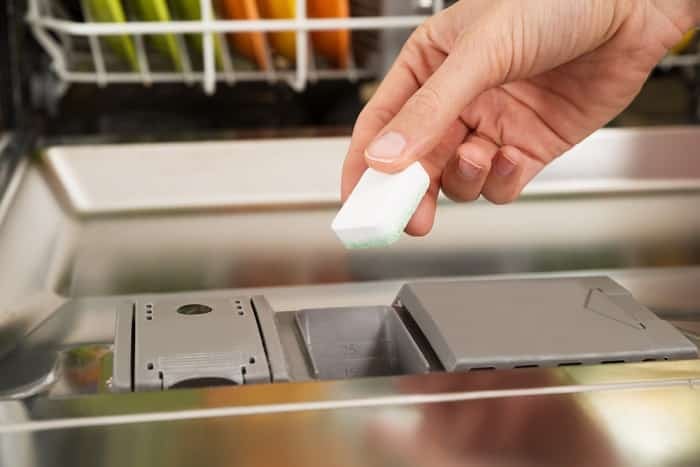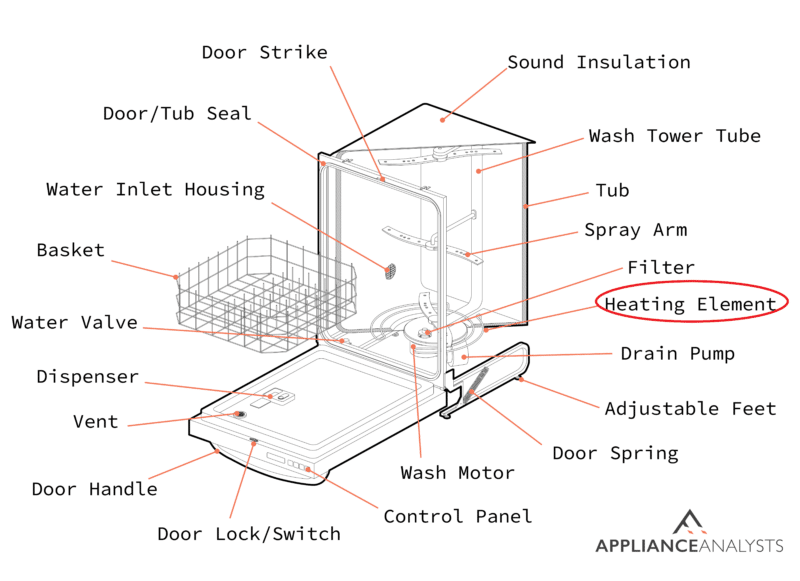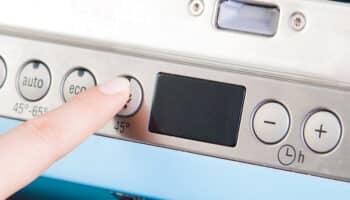We've independently reviewed this article to make sure it's as accurate as we can make it.
To find out more about our article creation and review process, check out our editorial guidelines.
Is your dishwasher running for too long?
Don’t worry, you’re not alone. I know how frustrating it can be to have your dishwasher running for hours, especially when you’re concerned about the impact long cycles may have on your utility bills.
Luckily, you’ve come to the right place to shorten your dishwasher’s running time.
Dishwasher cycles usually range from 1 hour to 4 hours if it’s an extended cycle. But, the run time varies depending on different factors, such as the selected cycle, the soil level of your dishes, dishwasher efficiency, water hardness, and even the age of your appliance.
Read on to learn why your dishwasher is running longer than normal and how to fix it!
Why trust us? This article was written by Craig Anderson and James Blackford.
Craig has helped thousands of other homeowners repair their appliances since 2016.
James is one of our resident appliance experts, with over 16 years of experience. He currently works as a Master Technician for SquareTrade, and runs his own appliance repair business.
How Long Does a Dishwasher Run – and Why So Long?
Does your dishwasher seem to run, and run, and run, non-stop?
You’ve been to the supermarket, vacuumed the house, and even caught up on some TV, and it’s still going! All this may have you wondering, why is your dishwasher taking so long?
The following reasons are probably why.
#1 Your Dishwasher Is Newer… And Slower
Is your dishwasher quite new? If so, you might be surprised to learn that the more recent models typically take longer than older ones.
In my experience, the main reason new dishwashers run for a long time is that newer motors are smaller and more energy efficient than older ones.
Newer motors don’t have enough power to run the upper and lower spray arms at the same time, so there’s a component known as an “actuator” that alternates the water supply between the upper and lower racks. However, this takes a lot longer to do the job!
There are actually quite a few differences between modern and old dishwashers, such as:
| Old Dishwashers | New Dishwashers |
| Old dishwashers run for less time than modern dishwashers. The average old dishwasher run time for a normal cycle is around an hour. Old dishwashers use more electricity and water. | New dishwashers run for longer than old dishwashers. The average new dishwasher run time for a normal cycle is over 2 hours. New dishwashers use less electricity and water. |
What can you do to make your new dishwasher faster? That’s a tricky question, but here are some practical steps that are a great starting point:
- Dishwashers and sinks typically share a hot water line, so briefly place your hand under the running water in your sink to check the temperature. If it feels excessively hot, and you need to pull your hand away after just a few seconds, the temperature is probably within the desired range (120 degrees).
- Use the right washing detergent to prevent performance issues such as excessive sudsing that can lead to leaks. Also, make sure to use the right amount of detergent – too much is not good!
- Clean the dishwasher with a tablet cleaner or vinegar and run on a clean cycle at least once a month.
A key takeaway here is that if your dishwasher is running for a long time, it may be intended! If your dishwasher is newer, a long run time isn’t a bad sign. You may just need to plan around it, and expect it to take longer.
#2 The Dishes Are Very Dirty
Many modern dishwashers include soil sensor technology, commonly known as “Auto Wash”, “Smart Wash”, or “Auto Sense”.
These sensors will detect the level of soiling on the dishes and adjust the cycle duration accordingly. The dirtier the dishes, the longer the cycle.
Is your dishwasher full of plates from breakfast and lunch? If so, the dishes may only be smeared with butter, milk, and sandwich crumbs. In this case, the dishwasher sensors may default to a shorter dishwasher cycle.
But what if your dishwasher is full of ironed-on spaghetti bolognese stains, or is full of greasy pots and pans? Then a modern dishwasher’s sensors will keep those dishes on a longer cycle.
Depending on how ingrained the dirt is, you may not be seeing those plates again until sunrise. It’s important that you check that the dishes are clean once the cycle is done, because if they’re still dirty, you might have additional issues on your hands.
To shorten the length of your dishwasher’s cycles, try the following tips:
- Scrape your dishes well before putting them in the dishwasher.
- Put your dishes on a “heavy” or “intensive” wash cycle when the plates are very dirty.
#3 The Water Heats Slowly
The average dishwasher cycle reaches temperatures of up to 160° F. How long it takes for your dishwasher to reach this temperature depends on the speed of the water heater and the temperature of the water coming into the machine.
Some dishwashers have an Auto Hot Start cycle, which could extend your dishwasher run time up to 20 minutes as it heats the water ready for washing.
To make your dishwasher run faster, try the following:
- Avoiding programs such as “Auto Hot Start”. A normal dishwashing cycle will heat the water as the cycle progresses. You can disable this by following your dishwasher’s manual.
- Running the hot water in the sink for 2 to 3 minutes before starting a dishwasher cycle. This will give the dishwasher a head start with some hot water and shorten the cycle.
#4 The Dishwasher Is Energy-Efficient
Another reason why your dishwasher is running for too long is that it’s EnergyStar certified.
This energy efficiency rating can help you do your bit for the planet and save up to $35 a year on your electricity bill, but it also comes at a cost.
Modern energy-efficient dishwashers wash slower than normal dishwashers, as they use less water and wash at lower temperatures.
The water reduction and lower temperatures are great. But, of course, when you reduce the quantity of water and its temperature, then something has to give. And in this case, it’s the speedy wash time.
But where there’s a will, there’s a way. So here are a couple of things you can do that could speed up the cycle of your dishwasher:
- Scrape your plates well before you start the cycle
- Rinse the plates before you put the dishwasher on
#5 You’ve Got Hard Water or Limescale
Do you live in a hard water area? Hard water can cause a build-up of minerals and limescale in your dishwasher.
Remember the sensors we discussed earlier (Smart Wash, Auto Sense, or Auto Wash)? Well, mineral deposits could build up in the sensors’ lens and affect their accuracy, which can cause the dishwasher cycle to take too long.
But don’t despair, you won’t have to put in soft water filters in your plumbing to fix this problem. Here’s what you can do:
- Use dishwasher cleaner tablets on a monthly basis and sanitize your appliance every 6 months.
- Place a cup filled with 1/4 regular vinegar on the top rack. As your dishwasher fills with water, the cup will gradually release vinegar during the wash, which will help to tackle any buildup and keep your dishwasher clean.
- Add 2 teaspoons of table salt to the soap dispenser before adding the soap to both compartments. If you live in an area with hard water, this will clean more efficiently, help maintain the dishwasher and make the glasses sparklier and prettier.

Other Elements That Might Be to Blame
Many of the components found inside modern dishwashers are meant to work well with each other, but as my grandad would say, “…back in my day, things were actually built to last!”.
If none of the tips above have helped, it’s likely that there’s a faulty component within your appliance, such as:
- The Heating Element: Unlike older dishwashers that relied on people’s water heaters to set the water temperature, a lot of modern models have their own heating element to adjust this to your liking. If the advice I provided above to make the water hotter didn’t work, chances are the heating element is failing within your dishwasher, and it needs attention.
- The Thermostat: A thermostat works hand in hand with the heating element to deliver water at the right temperature to wash your dishes. While the heating element heats up the water, the thermostat senses the temperature in order to regulate it throughout the cycle. If the thermostat fails, you’ll get scalding or cold water, with the latter resulting in longer running times.
- Overloading: Granted, overloading isn’t a component inside your dishwasher but rather a bad practice; however, it plays a key role in the appliance’s running time. All dishwashers have a maximum recommended load capacity, and while exceeding it won’t make yours break down immediately, it can force it to work harder, taking longer to complete a cycle and consuming more resources (water, power, etc.).

If you want to get any replacement part – or see how much one would cost – click to enter your model number in the search bar below. Our partners at AppliancePartsPros stock almost every part with free guides on how to install them.

Dishwasher Cycles and Their Run Times
The amount of time your dishwasher will take to run also depends on the cycle you put it on.
Here’s a list of some of the most common dishwasher cycles and their average run times.
| Dishwasher Cycle | Average Run Time |
|---|---|
| Auto Clean Cycle | The run time for every cycle is different. It is determined by the sensors and how soiled your dishes are. |
| Quick Cycle | 30 minutes or less |
| Normal Cycle | Between 1 and 3 hours |
| Heavy Cycle | Between 2.5 and 4 hours |
| Eco-Cycle | Between 2.5 and 4 hours |
This is a good rough estimate for cycle times. It will vary depending on how dirty your dishes are, how quickly the water heats up, whether your dishwasher is energy efficient or not, and water hardness.
Can You Stop a Dishwasher in the Middle of a Cycle?
Yes, you can interrupt a dishwasher in the middle of a cycle!
Contrary to popular belief, if you open your dishwasher mid-cycle, your dishwasher won’t start overflowing – turning your kitchen into a scene from Titanic. Not unless there’s something wrong with it.
Fortunately, dishwashers do not fill up with water during a cycle. This means that you can open yours and slip in that last, rogue dirty plate without fear of opening an aquatic park in your kitchen. Opening your dishwasher also won’t do any damage to it, but if it keeps stopping mid-cycle for no apparent reason, that’s a different story.
So what will happen if you stop your dishwasher in the middle of a cycle? It really depends on which phase the dishwasher is in when it stops. But here is what you can expect when you open it:
- A whole load of steam
- A couple of splashes of water
- If your machine is halfway through a drying cycle, you may have to press the start button again. Only do this if it doesn’t automatically start drying again when you shut the door.
Conclusion
That about covers it! Here’s a quick summary of everything we’ve discussed so far:
| The run time will be longer | The run time will be shorter | |
| The dishes are very soiled | ✓ | |
| The water heats slowly | ✓ | |
| The dishwasher is energy-efficient | ✓ | |
| The dishwasher is old | ✓ | |
| You have hard water/limescale | ✓ |
If this article has helped you, why not check out some of our other articles and free guides? You could even sign up for our email list!
Have a great day.
—Craig.








